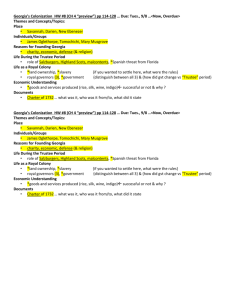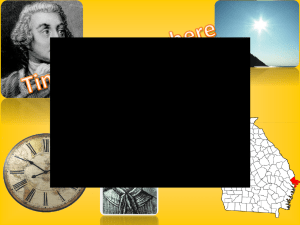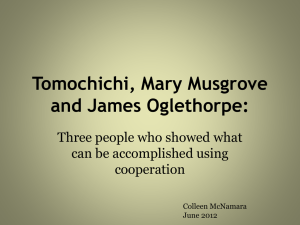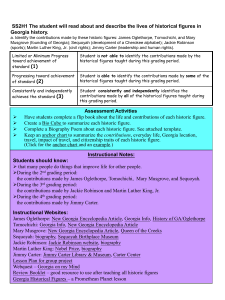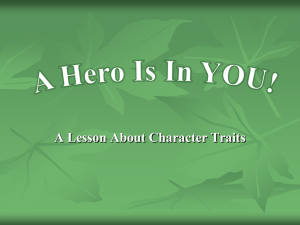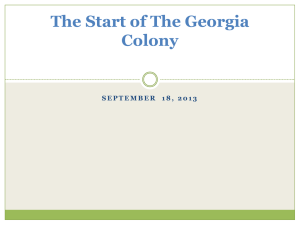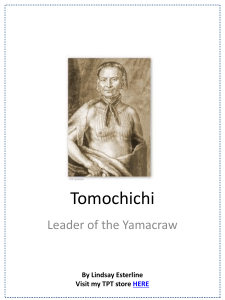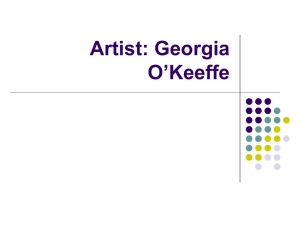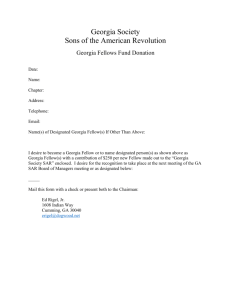Lesson Plan #10
advertisement
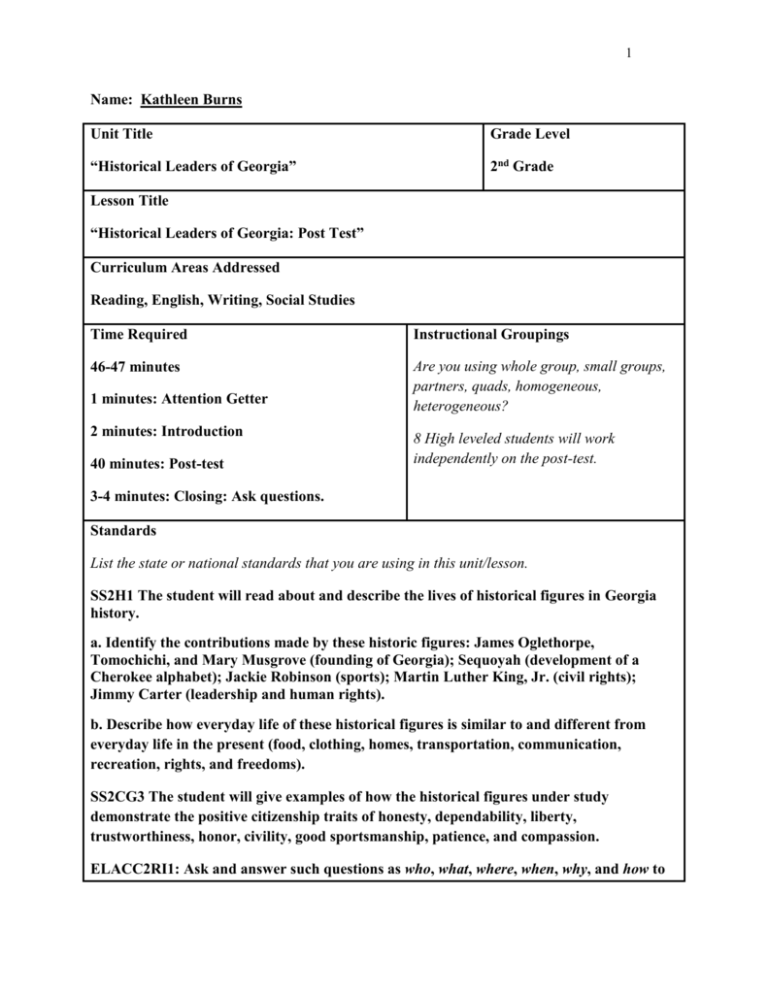
1 Name: Kathleen Burns Unit Title Grade Level “Historical Leaders of Georgia” 2nd Grade Lesson Title “Historical Leaders of Georgia: Post Test” Curriculum Areas Addressed Reading, English, Writing, Social Studies Time Required Instructional Groupings 46-47 minutes Are you using whole group, small groups, partners, quads, homogeneous, heterogeneous? 1 minutes: Attention Getter 2 minutes: Introduction 40 minutes: Post-test 8 High leveled students will work independently on the post-test. 3-4 minutes: Closing: Ask questions. Standards List the state or national standards that you are using in this unit/lesson. SS2H1 The student will read about and describe the lives of historical figures in Georgia history. a. Identify the contributions made by these historic figures: James Oglethorpe, Tomochichi, and Mary Musgrove (founding of Georgia); Sequoyah (development of a Cherokee alphabet); Jackie Robinson (sports); Martin Luther King, Jr. (civil rights); Jimmy Carter (leadership and human rights). b. Describe how everyday life of these historical figures is similar to and different from everyday life in the present (food, clothing, homes, transportation, communication, recreation, rights, and freedoms). SS2CG3 The student will give examples of how the historical figures under study demonstrate the positive citizenship traits of honesty, dependability, liberty, trustworthiness, honor, civility, good sportsmanship, patience, and compassion. ELACC2RI1: Ask and answer such questions as who, what, where, when, why, and how to 2 demonstrate understanding of key details in a text. ELACC2L2: Demonstrate command of the conventions of standard English capitalization, punctuation, and spelling when writing. As a result of this lesson/students will… Be Believe in the possibility and achievement of greatness. Be confident. Be honest. Understand (Essential questions, big ideas, principles, generalizations, rules, etc.) Enduring Understanding(s): The types of relationships built among individuals of different cultures can affect outcomes for whole societies. Essential Questions: “Who are James Oglethorpe, Mary Musgrove, and Tomochichi?” “What were the major contributions of James Oglethorpe, Mary Musgrove, and Tomochichi?” “How did James Oglethorpe, Mary Musgrove, and Tomochichi impact Georgia in the past and in the present?” “What leadership characteristics allowed James Oglethorpe, Mary Musgrove, and Tomochichi to make a difference to others?” “How does your transportation, communication, recreation, and clothing today compare and contrast to that of James Oglethorpe, Mary Musgrove, and Tomochichi in the past?” Know (Facts, vocabulary, how-to’s, information that is memorable – knowledge you will assess) Topics: Historical Leaders of Georgia Interdisciplinary Concepts: Relationships Facts: James Oglethorpe, Mary Musgrove, and Tomochichi are 3 historical leaders because of their major and long lasting contributions to the state of Georgia. James Oglethorpe founded Georgia. Georgia is named after Kind George II of Great Britain. Mary Musgrove spoke the languages of Creek and Indian, so she served as an interpreter between James Oglethorpe and Tomochichi. Tomochichi established peace with Oglethorpe and the other English settlers. 3 All 3 historical figures displayed leadership characteristics, such as dependability, honesty, respect (civility), trustworthiness, and compassion. The everyday life (food, clothing, homes, transportation, communication, recreation, rights, and freedoms) of the colonial settlers of the Georgia colony, James Oglethorpe, and the Creek Indians is similar and different to the everyday life in the present. Do (Skills) (Thinking skills, skills of the discipline – skills you will assess) Write down knowledge learned over past two weeks by choosing the correct multiple choice, fill in the blank, True/False, Venn diagram, and matching answers. Identify contributions and characteristics of James Oglethorpe, Mary Musgrove, and Tomochichi. Identify definitions of vocabulary words. Use knowledge to write response to short answer question. Compare and contrast everyday life in “Georgia Now” with “Georgia in the Past.” Steps in the Lesson (Include the attention getter or the hook for the lesson, the introduction, the lesson procedures including ideas for whole-class, small group, and individual instruction, differentiated activities) Attention Getter or Hook To catch the students’ attention, the teacher will wave test around in the air and proclaim, “It is time to take a “Celebration of Knowledge” ! Introduction “Today we will be taking our post test on our “Historical Leaders of Georgia” unit. Are there any last minute questions before we begin the test?” Body or Procedure 1. Tell students to put up binders to block view of other students from seeing tests accidentally or purposefully. 2. Encourage students. “You know everything you need to take this test. You can do it! Believe in yourself!” 3. Pass out test to everyone in class. 4. Read test questions and choices to children twice. 5. Complete test. 6. Take up test. Closure/Wrap-Up 4 Ask questions to connect back to standards and essential questions. “How did you enjoy learning about the founder of Georgia?” Name something about your state, Georgia, that you now know after our two week unit. “Why have we learned about leaders in this unit? How can you demonstrate the character traits of leaders discussed in your own life? What will I differentiate? (content, product, process) Sit individual students in areas throughout the classroom, so they are not facing other students. This will help students who become distracted easily and those who panic or distress when other students finish test questions before them. How will I differentiate for featured student 1? Ensure student he has all the knowledge he needs to take test since he seems to demonstrate affects of test anxiety. Monitor for emotional distress throughout test and provide encouragement. How will I differentiate for featured student 2? While questions are repeated twice for class, repeat a third time to him individually to ensure comprehension of question. Assessment (How will you evaluate the KNOW, Do, BE? What type of assessment will you use? What constitutes success for the students? Use summative assessment to grade post test for completion and correct answer responses. Materials, Additional Resources, and Background Information (Any websites, materials, and background that you will need or use.) Materials: Pencils Post Tests Test Blockers Resources: Unit pre-test Background Information: Social Studies Book (Teacher Edition): “Houghton Mufflin Social Studies: Our State: Georgia” by: Dr. Herman J. Viola, Dr. Sarah Witham Bednarz, Dr. Carlos E. Cortes, Dr. Cheryl Jennings, Dr. Mark C. Schug, & Dr. Charles 5 S. White Clear Links to Theories Montessori stressed the importance of the organization of the classroom. Test blockers will help each student’s desk area to be organized. The emotional atmosphere, or environment, of the classroom is also important. By giving positive words of encouragement and speaking positively, the teacher can help the students feel even better prepared for a test by allowing them to go into it with their head held high. A teacher can help students feel confident about their ability to know and show what they know. Connections to Technology and/or the Arts: N/A Description of Collaboration With Others: I collaborated with other cohort members and Assessment teacher on number of questions to put on post-test.
